
SEDIMENTOLOGY
Scope & Guideline
Unveiling the complexities of sedimentary processes.
Introduction
Aims and Scopes
- Sedimentary Processes and Dynamics:
Research on the mechanisms of sediment transport, deposition, and alteration, including studies on gravity flows, turbidity currents, and sediment gravity flow dynamics. - Stratigraphic Analysis and Interpretation:
Exploration of stratigraphic architectures and depositional models, including the analysis of sedimentary facies, sequence stratigraphy, and the impact of tectonics and climate on sedimentation. - Palaeoenvironmental and Palaeoclimatic Studies:
Investigating sedimentary records to reconstruct past environments and climate conditions, utilizing geochemical, isotopic, and microfossil analyses. - Microbial and Biogenic Sedimentation:
Focus on the role of biological processes in sediment formation, including microbialites and biogenic carbonate production. - Experimental Sedimentology:
Utilization of laboratory experiments to model sedimentary processes and understand the physical behavior of sediments under various conditions. - Environmental and Anthropogenic Influences:
Assessment of the impact of natural and human-induced changes on sedimentary systems, including studies on deltaic and coastal environments.
Trending and Emerging
- Interdisciplinary Approaches:
An increasing number of studies are integrating sedimentology with other disciplines such as geochemistry, ecology, and climate science, emphasizing the interconnectedness of sedimentary processes with broader environmental systems. - Impact of Climate Change on Sedimentary Processes:
Research focusing on how climate change affects sediment dynamics, including changes in river discharge, sediment supply, and coastal erosion, is gaining prominence, reflecting global environmental concerns. - Microbial Influences on Sedimentation:
The role of microbes in sediment formation and alteration is being increasingly recognized, with studies exploring microbialites and biogenic processes becoming more prevalent. - Advanced Analytical Techniques:
The use of cutting-edge technologies such as high-resolution imaging, geochemical analysis, and numerical modeling is on the rise, enabling more detailed investigations of sedimentary processes. - Anthropogenic Effects on Sedimentary Systems:
Research addressing the impacts of human activity on sedimentary environments, particularly in deltaic and coastal regions, is emerging as a critical area of study. - Experimental and Numerical Modeling:
There is a growing trend towards experimental and numerical modeling approaches to simulate sedimentary processes, providing insights into complex interactions that occur in natural settings.
Declining or Waning
- Traditional Facies Models:
There appears to be a waning interest in simplistic facies models that do not account for the complexities of sedimentary processes and depositional environments, as researchers increasingly adopt more integrated and dynamic approaches. - Focus on Purely Physical Sedimentology:
Research that solely emphasizes physical mechanisms of sediment transport without incorporating biogeochemical or ecological perspectives is becoming less prominent, suggesting a shift towards more holistic studies. - Sedimentology of Ancient Systems:
The study of ancient sedimentary systems has seen a decrease, with a growing emphasis on modern analogues and their implications for understanding contemporary processes. - Single-Disciplinary Approaches:
There is a noticeable reduction in studies that limit their scope to a single discipline (e.g., strictly geological or purely biological) as interdisciplinary approaches gain traction.
Similar Journals

Depositional Record
Elevating interdisciplinary dialogue in sedimentology and beyond.Depositional Record, published by WILEY, stands as a vital resource for researchers and professionals in the fields of Geology, Paleontology, Oceanography, and Environmental Science. Since its inception in 2015, this Open Access journal has been dedicated to advancing the understanding of sedimentary processes, depositional environments, and their implications on Earth's history and contemporary climate dynamics. With an impressive array of categorizations, including Q1 rankings in Geology, Paleontology, and Stratigraphy, it underscores its significant contribution to these scientific arenas. The journal’s reach is reflected in its Scopus rankings, placing it within the top quartiles in multiple categories, indicating the high quality and impact of its published research. Researchers, students, and professionals who engage with Depositional Record will find a treasure trove of knowledge aimed at informing best practices, innovative studies, and fostering an interdisciplinary dialogue crucial for environmental stewardship and geological exploration.
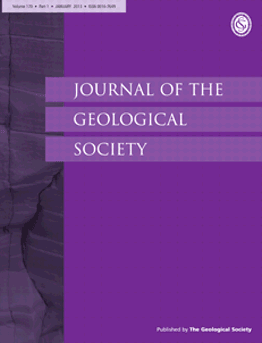
JOURNAL OF THE GEOLOGICAL SOCIETY
Your Premier Source for Geological Innovation and DiscoveryJOURNAL OF THE GEOLOGICAL SOCIETY, published by GEOLOGICAL SOC PUBL HOUSE, is a premier academic journal dedicated to advancing the field of geology. With a rich history dating back to 1845 and continuously published until 2024, this journal caters to a diverse audience of researchers, professionals, and students involved in earth sciences. The journal is recognized for its high impact factor, situating it in the top Q1 category in the field of geology, as indicated by its impressive Scopus rank of #49 out of 321, positioning it at the 84th percentile in Earth and Planetary Sciences. This esteemed scholarly platform promotes rigorous peer-reviewed research, ensuring that novel findings contribute to the global geological discourse. Although it operates under a subscription model, the journal's archive offers valuable insights for anyone pursuing excellence in geological research. The JOURNAL OF THE GEOLOGICAL SOCIETY stands as a vital resource for disseminating scientific knowledge and fostering educational growth within the field.
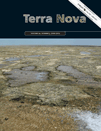
TERRA NOVA
Exploring the Depths of Geological InnovationTERRA NOVA, published by WILEY, is a leading journal in the field of Geology, with a remarkable impact within the academic community. With the ISSN 0954-4879 and E-ISSN 1365-3121, the journal has been a pivotal platform for innovative research since its inception in 1989 and will continue its influence through to 2024. Ranked in the top tier (Q1) of its category for 2023, TERRA NOVA holds an esteemed position with a Scopus ranking of 67 out of 321 in Earth and Planetary Sciences, showcasing its dedication to high-quality, impactful scientific discourse. The journal covers a diverse range of topics within geology, providing valuable insights for environmental scientists, geologists, and industry professionals. By fostering an interdisciplinary approach, TERRA NOVA remains committed to advancing the understanding of geological processes and their implications for society. With a dedicated readership of researchers, professionals, and students, this journal is essential for those looking to stay abreast of the latest developments and trends in the field.
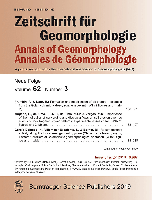
ZEITSCHRIFT FUR GEOMORPHOLOGIE
Advancing Knowledge in Geomorphological Processes.ZEITSCHRIFT FUR GEOMORPHOLOGIE is a prestigious journal dedicated to the field of geomorphology, published by GEBRUDER BORNTRAEGER from Germany. With the ISSN 0372-8854 and E-ISSN 1864-1687, this journal serves as a vital platform for researchers, professionals, and students interested in understanding the dynamic processes that shape our Earth’s surface. The journal has consistently maintained a solid academic reputation, achieving a Q3 ranking in key categories including Earth and Planetary Sciences (miscellaneous), Earth-Surface Processes, and Geography, Planning and Development as of 2023. This reflects its position within the global scientific community; ranked at #93 out of 179 in Earth-Surface Processes, contributing to crucial discussions surrounding environmental changes and landform evolution. Although ZEITSCHRIFT FUR GEOMORPHOLOGIE is not an Open Access publication, it offers extensive insights and findings from converged years spanning from 1979 to 2019 and again from 2021 to 2022. The journal is located at Johannesstr 3A, D-70176 Stuttgart, Germany, and plays a pivotal role in advancing geomorphological research that impacts natural sciences, ecology, and planning strategies worldwide.
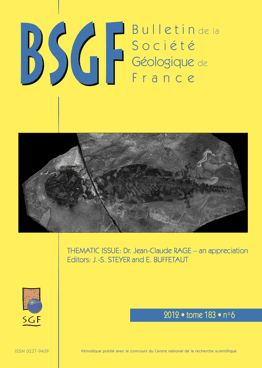
BSGF-Earth Sciences Bulletin
Illuminating Earth Sciences for a Sustainable FutureWelcome to the BSGF-Earth Sciences Bulletin, a premier open-access journal published by EDP SCIENCES S A that has been illuminating the field of earth sciences since its inception. With an ISSN of 0037-9409 and an E-ISSN of 1777-5817, this journal has established itself as a vital platform for disseminating significant research findings and innovative studies in Earth and Planetary Sciences. Operating out of France, BSGF is recognized for its rigorous peer-review process and its commitment to accessibility, having transitioned to open access in 2018. This stature is reflected in its outstanding rankings, placing it in the Q1 quartile within both Earth and Planetary Sciences and Geology disciplines, and ranking #35/195 overall in the Scopus database. Researchers, professionals, and students alike will find the BSGF invaluable for its high-impact articles, which span a wide array of sub-disciplines, addressing both foundational concepts and contemporary challenges in earth sciences.
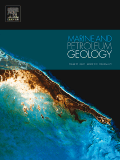
MARINE AND PETROLEUM GEOLOGY
Innovating Insights for a Sustainable FutureMarine and Petroleum Geology, published by Elsevier Science Ltd, is a premier, multidisciplinary journal that addresses critical advancements in the fields of geology, geophysics, oceanography, stratigraphy, and economic geology. With an impressive 2023 impact factor reflecting its influence across these vital domains, this journal maintains a prestigious standing, having achieved a Q1 ranking in multiple categories, including Economic Geology and Geophysics. Since its inception in 1984, it has been a key platform for researchers and practitioners to disseminate innovative findings, foster interdisciplinary dialogue, and enhance our understanding of geological processes affecting marine and petroleum resources. The journal is particularly valuable for those looking to stay abreast of the latest developments in Earth sciences, contributing to both academic knowledge and practical applications. Available through traditional subscription access, it serves as a cornerstone resource for scientists, students, and professionals eager to engage with cutting-edge research.
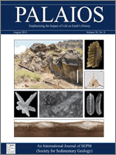
PALAIOS
Illuminating Historical Biodiversity PatternsPALAIOS is a renowned journal published by the SEPM-Society for Sedimentary Geology, focusing on the interdisciplinary fields of paleontology and sedimentary geology. Established in 1986, this scholarly publication serves as a vital platform for disseminating innovative research and insightful reviews that bridge ecological and evolutionary aspects with paleontological studies. With an impressive track record, the journal has achieved a commendable impact factor and consistently holds a Q2 ranking in both Ecology, Evolution, Behavior and Systematics and Paleontology as of 2023. Researchers and professionals will benefit from the diverse range of studies presented, which encompass fossil analysis, stratigraphy, and the impacts of climate change on past ecosystems. By being at the forefront of research and education in these fields, PALAIOS not only enhances comprehension of historical biodiversity patterns but also informs contemporary ecological theories.
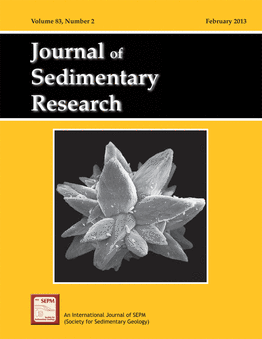
JOURNAL OF SEDIMENTARY RESEARCH
Connecting Scholars through Sedimentary DiscoveriesThe JOURNAL OF SEDIMENTARY RESEARCH, published by SEPM-SOCIETY FOR SEDIMENTARY GEOLOGY, stands as a pivotal peer-reviewed journal in the field of sedimentary geology. With an ISSN of 1527-1404 and an E-ISSN of 1938-3681, this esteemed journal features a broad scope, delving into the intricacies of sedimentary processes, lithology, and stratigraphy since its inception in 1931. Enjoying a distinguished reputation, it has achieved a Q1 category ranking in Geology for 2023 and ranks 87 out of 321 in Earth and Planetary Sciences, placing it in the 73rd percentile among its peers in Scopus. With continued access options available, it facilitates the dissemination and discussion of cutting-edge research that shapes the understanding of sedimentary phenomena. Researchers, professionals, and students alike benefit from this critical platform that fosters academic engagement and drives progress within the field.

BULLETIN OF THE GEOLOGICAL SOCIETY OF DENMARK
Fostering Scholarly Dialogue in Geological SciencesBULLETIN OF THE GEOLOGICAL SOCIETY OF DENMARK, published by the Geological Society of Denmark, serves as a key platform for the dissemination of original research and comprehensive reviews related to geological studies in Denmark and beyond. With an ISSN of 2245-7070, this journal provides a significant avenue for sharing findings that contribute to our understanding of geological processes, resources, and the history of the Earth. Although it operates under traditional access options, the journal encourages a rich scholarly dialogue among researchers, professionals, and students alike. Its impact is evident in the broad scope it covers, catering to diverse areas of geology, including but not limited to sedimentology, paleontology, and environmental geology. By fostering an environment of knowledge sharing, the BULLETIN OF THE GEOLOGICAL SOCIETY OF DENMARK is not just a journal; it is a vital resource for anyone invested in advancing geological science.

Gondwana Research
Advancing the Frontiers of Geological DiscoveryGondwana Research is a premier academic journal published by Elsevier, specializing in the field of geology, with a robust focus on the geological history and processes of the Gondwana supercontinent. With an impressive impact factor and ranking as Q1 in the 2023 Geology category, it stands as a leading platform for disseminating high-quality research. The journal features articles that advance the understanding of Earth and planetary sciences, making significant contributions to geological education and research. Researchers will find its curated content particularly valuable, as it encompasses a wide array of topics including stratigraphy, paleontology, and tectonics, all relevant to both contemporary and historical geological inquiries. Given its substantial reach and esteemed standing—ranked 5th out of 321 in its field—Gondwana Research plays a crucial role in fostering scientific exchange among global experts. Located in the United States with publication continuity from 1997 to 2024, this journal consistently attracts submissions from leading scientists, ensuring that its readership is kept at the forefront of geological discovery and innovation.